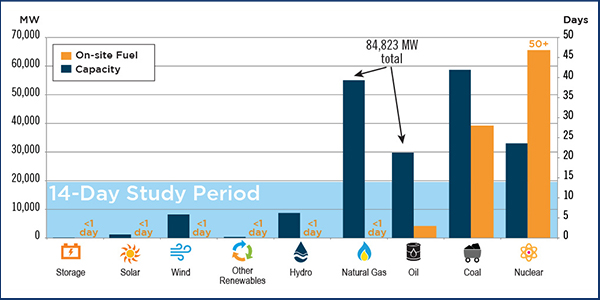By Christen Smith
VALLEY FORGE, Pa. — The PJM Markets and Reliability Committee agreed to sunset the Fuel Security Senior Task Force on Thursday after determining the RTO seems prepared enough, for now, for any potential reliability threats.
Except, some utilities argued, PJM stakeholders should do more than the “minimum” required to protect against fuel supply issues — especially when generators can signal a deactivation in as little as 90 days ahead of time.
The MRC approved the task force’s issue charge in March to investigate what market responses to conditions could lead to fuel insecurity and assessing whether the current market construct is sufficient to cure the problem. (See PJM Stakeholders Reluctantly OK Fuel Security Initiative.)
PJM Director of Energy Market Operations Tim Horger said Thursday that stakeholders could decide either to maintain the status quo with periodic reviews of the RTO’s fuel security or pursue more aggressive paths to implement market, operational and planning changes. A nonbinding poll of 204 stakeholders determined that 74% agreed nothing more needed to be done.
Exelon, FirstEnergy and Dominion Energy were not among those in favor.
“These retirements can cause a significant shift on installed reserve margins,” said Sharon Midgley, Exelon’s director of wholesale market development. “Generation owners have a line of sight into how resources are doing from an economic standpoint that PJM does not have.”
Midgley added that resilience-based events cannot be averted by market-based solutions developed after the fact, so it would be prudent to initiate a discussion on potential criteria or solutions in 2020, so planning could occur in advance of any issue.
Paul Sotkiewicz, president of E-Cubed Policy Associates and PJM’s former chief economist, said because of the three-year forward structure of the capacity market, the average retirement notice falls somewhere between 30 and 33 months. He said that PJM’s analysis — which included 324 different scenarios — shows “there’s no urgent or imminent problem.”
Bob O’Connell, director of regulatory affairs and compliance for Panda Power Funds, pointed to yearly reports from Monitoring Analytics, PJM’s Independent Market Monitor, that provide a high-level view of generator economics in the RTO.
“I think the Market Monitor does an excellent job of highlighting generation at risk in its annual State of the Market Report,” he said. “While it may be done at a rough level based on types of assumptions that need to be made, I think it does give a pretty good indication of where the economics are regarding retirement.”
The utilities disagreed, arguing that the Monitor does not take into account risks associated with plant operations and presumes that PJM’s short-run capacity market outcomes are sufficient to benchmark the prudence of continued investments in long-lived assets.
Jim Davis, an electric policy market consultant for Dominion, said the average retirement notice doesn’t tell the full story of PJM’s changing resource portfolio.
“Even though the average is three years in advance, that could be accelerated in the future given the advancement of renewables,” he said. “From our experience, pipelines are being constrained more frequently [than before].”
Susan Bruce, of the PJM Industrial Customer Coalition, said that perhaps the idea of just monitoring the situation, as part of the status quo path, “might not be the right phraseology.”
“It has a more passive approach than many from the outside looking in might expect,” she said, mentioning that some continued reporting to stakeholders might help ease concerns.
The MRC approved the status quo path in a sector-weighted vote of 4.5 to 0.5. A motion from the D.C. Office of the People’s Counsel to sunset the task force was endorsed by acclamation, with objections from Exelon, Dominion and FirstEnergy.







